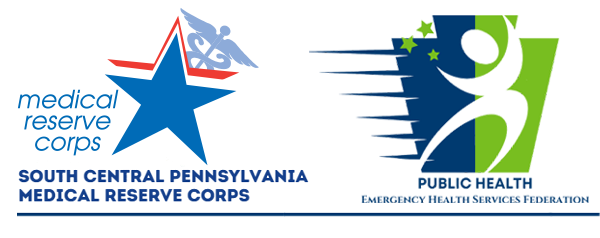Frequently Asked Questions
Community members, with or without medical training, who are willing to support public health on a daily basis or during public health emergencies are encouraged to join. This includes professionals from all of the health occupations. MRC units have non-medical volunteers who provide education, logistics, communication, coordination and other support.
Yes. MRC units need both medical and non-medical volunteers. Some volunteer positions require licensure, to protect the volunteer as well as to ensure the best care for those in need of medical attention. In the event of a disaster, healthcare professionals without an active license could serve as medical interviewers, clinic coordinators and other positions. There will also be a need for volunteers without medical training.
Please register to become a volunteer by visiting SERV PA (https://serv.pa.gov/). Once you apply, your application is immediately forwarded to the MRC coordinator in your area. If you need assistance, please email mrc@ehsf.org
As a volunteer, there is no obligation. We understand you may have work and family commitments that prohibit you from volunteering at any given time. If you will be unavailable for an extended period of time due to illness or relocation, please contact your MRC unit coordinator so they can change your volunteer status.
Federal Law
- The federal Volunteer Protection Act (codified at 42. U.S.C. §14501 et. Seq.) provides qualified immunity of liability for volunteers and, subject to expectations, preempts inconsistent state laws on the subject, except for those that provide protections stronger than those contained in the Volunteer Protection Act.
- Under the Volunteer Protection Act, a volunteer of a non-profit organization or governmental entity is immune from liability for harm caused by an act or omission of the volunteer on behalf of the organization or entity if:
- The act or omission was within the scope of the volunteer’s responsibilities in the organization or entity.
- The volunteer was properly licensed, certified or authorized by the appropriate state authorities for the activities or practice giving rise to the claim.
- The harm was not caused by “willful or criminal misconduct, gross negligence, reckless misconduct or a conscious flagrant indifference to the rights or safety of the individual harmed by the volunteer.”
- The harm was not caused by the volunteer’s operation of a motor vehicle, vessel, aircraft, or other vehicle for which the state requires the operator to possess a license or maintain insurance.
Pennsylvania Good Samaritan and Related Act[1]
Civil immunity under the Pennsylvania Good Samaritan and Related Acts (42 PA CS 8331-8338) is afforded to individuals in the below categories for acts or omissions, except any acts or omissions intentionally designed to harm or grossly negligent acts or omissions which result in harm to the person receiving emergency care. Activities must be performed in “good faith”, which means the situation is such that rendering of care should not be postponed until patient is hospitalized.
- Any physician or practitioner of the healing arts or any registered nurse.
- Any individual using an AED, provided the AED is appropriately maintained and the user has completed training in its use.
- First Aid and Rescue personnel, except for any acts or omissions intentionally designed to harm; or grossly negligent acts or omissions which result in harm to the individual holds a current certificate evidencing successful completion of a course and the techniques employed are consistent with the nature and level of training for which the certificate has been issued.
- Volunteers in Public Service, unless the conduct of such a person falls substantially under the standards generally practiced and accepted in the circumstances and unless said person knew or should have known that their act created or substantiated risk of actual harm to the person or property of another.
- Design Professionals[2] who provide professional services related to a declared national, state, or local emergency when acting at the request of an official in an official capacity, unless the activities cause substantial risk of actual harm to the person or property of another.
- Physicians and nurses who participate in mass immunization projects.
MRC volunteers are considered local assets. However, federal partners and other states have contacted us during emergencies requesting volunteer support. All volunteer requests and information will be provided by your local, regional or state MRC coordinator. If you are willing to volunteer outside your local area, please indicate that when completing your volunteer application.
You will be notified by your local unit coordinator via the information that you provide when applying to join your MRC unit. You will receive an alert notification via email, text and/or phone from SERV PA. Therefore, it is very important that you keep your contact information current. You can access your volunteer profile at any time to update your information or contact your MRC coordinator at mrc@ehsf.org.
Your personal information in SERV PA is kept confidential and will not be shared beyond what is absolutely necessary for the purpose of your volunteer role. The Emergency Workforce Coordinator of the PA Department of Health and a very restricted number of SCPA MRC staff have administrative rights in SERV PA and have access to this information.
Your local MRC Unit Leader or MRC Planning and Administrative Chief at mrc@ehsf.org.
